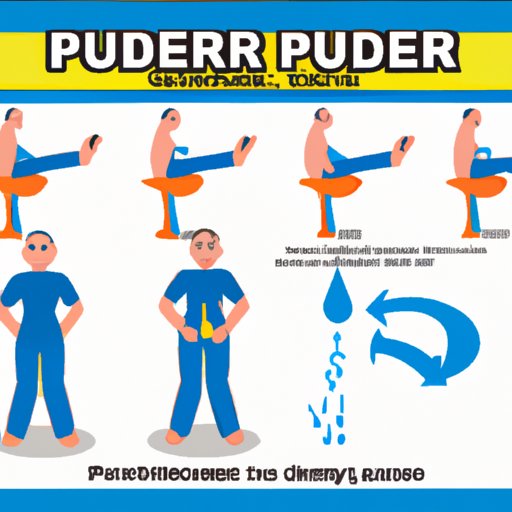
Introduction
Frequent urination can be a frustrating and embarrassing issue that affects people of all ages, from young children to older adults. At its worst, frequent urination can disrupt daily life, interfere with sleep, and even lead to social anxiety. Fortunately, there are several solutions to this problem. In this article, we will discuss how to stop peeing so much by exploring the following tips and solutions:
Reduce Caffeine and Alcohol Consumption
One of the primary causes of frequent urination is the consumption of drinks that have a diuretic effect, such as caffeine and alcohol. Diuretics increase urine production by promoting fluid loss in the body. If you’re experiencing frequent urination, cutting back on diuretics can be a useful first step.
To reduce your caffeine intake, try switching to decaffeinated coffee or tea. You can also switch to water or herbal tea, which are both hydrating and won’t stimulate urine production. While it may be difficult, try avoiding energy drinks and soda, which can contain high amounts of caffeine.
Similarly, reducing your alcohol consumption can also help reduce frequent urination. If you drink frequently, try limiting your alcohol intake to one or two drinks per day, or cutting back completely.
Practice Pelvic Floor Exercises
Another solution to reduce frequent urination is to exercise your pelvic floor muscles. These muscles support the bladder and urethra, and strengthening them can help alleviate bladder control problems, including frequent urination.
One of the most effective exercises to strengthen pelvic floor muscles is called Kegels. To do this exercise, sit comfortably and squeeze the muscles you use to stop urination mid-flow. Hold the squeeze for a few seconds and then relax. Repeat this exercise several times per day, gradually progressing to holding the squeeze for longer periods of time.
Stay Hydrated, But Don’t Overdo It
While it may seem counterintuitive, staying hydrated can actually help reduce frequent urination. When the body doesn’t get enough fluids, urine becomes concentrated. This can irritate the bladder and cause more frequent urination. However, there is a fine line between hydration and overhydration, which can also lead to frequent urination.
To find the right balance, try to drink about 8 cups of water per day. This should be a mix of water, other beverages, and foods with high water content. If you find yourself urinating too often or waking up at night to use the restroom, try cutting back on fluids after dinner.
Watch Your Diet
Certain foods and drinks can irritate the bladder, leading to more frequent urination. If you’re experiencing frequent urination, it’s a good idea to avoid or reduce intake of these bladder irritants.
Some common bladder irritants include:
– Caffeine
– Alcohol
– Carbonated drinks
– Spicy foods
– Acidic foods, such as tomatoes and citrus fruits
It’s also a good idea to reduce your salt intake, as too much salt can lead to dehydration and more frequent urination.
Try Bladder Training
Bladder training is a technique that can help increase the amount of urine your bladder can hold, reducing the need to urinate frequently. To try bladder training, try to gradually increase the amount of time between bathroom breaks. Start by waiting an extra 10-15 minutes between bathroom breaks, then gradually increase the time as your bladder becomes more comfortable holding urine.
Talk to Your Doctor
If you’ve tried the above solutions and are still experiencing frequent urination, it’s a good idea to talk to your doctor. Frequent urination can be a symptom of several medical conditions, including:
– Urinary tract infection
– Overactive bladder syndrome
– Diabetes
– Prostate gland enlargement in men
– Bladder cancer
Seeking professional medical advice can help you identify any underlying medical conditions and get the treatment you need.
Conclusion
Frequent urination can be a frustrating and embarrassing issue, but there are several solutions to help reduce it. By cutting back on diuretics, exercising your pelvic floor muscles, finding the right balance of hydration, avoiding bladder irritants, trying bladder training, and seeking professional medical advice if necessary, you can take control of your bladder and reduce frequent urination. Remember to be patient and stay positive; with the right approach, you can overcome this issue and improve your quality of life.




